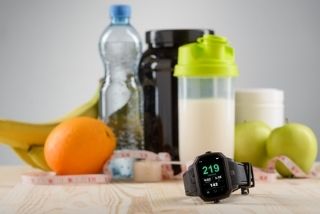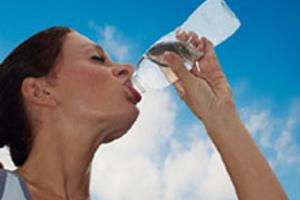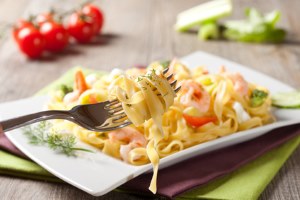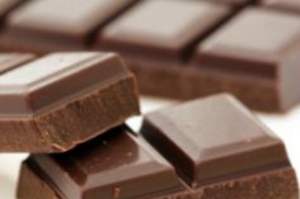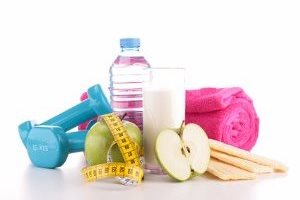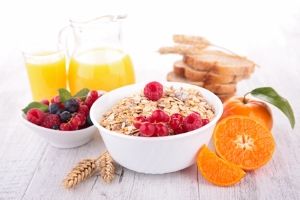Tip 1: eat your meals at regular time
Indeed, always eating at a fixed time allows the body to have a regular energy intake. As a result, your body will be able to adapt and optimally manage the digestion of food.
To stay in good shape, we often recommend a diet with lots of starch, moderate amounts of proteins and a low-fat meal.
Tip 2: eat healthy and varied
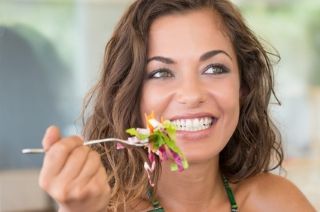
A balanced diet provides your body with the minerals and vitamins it needs. It is not only made with one meal, but several. Therefore, it is important to have breakfast first. The importance of carbohydrate and protein intakes from the first meal of the day determines the overall course of the day. Thus, if intakes are too low, your alertness, attention and concentration will be impaired. The next meal will not be able to compensate for the deficiencies caused by a lack of breakfast.
For all meals it is necessary:
- Carbohydrates: consume some with each meal to fill up with energy (pasta, rice, semolina, potatoes, etc.).
- Meat, fish, eggs 1 to 2 times a day for protein intake
- Fruit and vegetables as the saying goes "eat at least 5 fruits and vegetables a day". It is important to respect this for your vitamin, fibre and water intake.
- Dairy products: about 3 times a day (protein and calcium intake).
- Fat: indeed, you also need fat (but in moderation). They provide lipids and vitamins.
Physical activity consumes a lot of calories. It is therefore necessary to eat regularly to maintain the energy stock. Starchy foods, rich in complex carbohydrates, provide significant energy. For optimal effectiveness, eat it throughout the day, ideally with every meal.
What carbohydrates to eat?
There are carbohydrates and carbohydrates. Beware of erroneous concept of slow and fast carbohydrates. White pasta dish or pizza the night before a competition is not recommended! It is important to know select carbohydrates according to their GI and consume the right carbohydrates when you exercise.
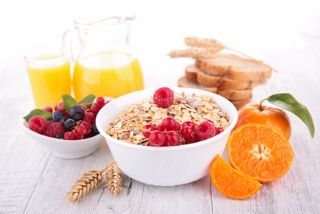
Example of meals type:
BREAKFAST
- Black coffee (without sugar)
- Fresh fruit salad
- 1 plain cottage cheese
- 2 slices toast or cereal
BREAKFAST
- Cod
- A bowl of basmati rice
- 1 fruit (apple, pear, kiwi, etc.)
COLLATION 16H00
- 1 cereal bar
DINER
- Asparagus
- Omelette
- 1 soy yoghurt
Tip 3: eat before the effort
It is important to eat before exercise. This meal will directly impact your physical performance. If the diet is insufficient, hypoglycemia may result. If it is too high, it can cause digestive problems. This is why, before exercise, choose a meal that is both digestible and complete.
Your priority must be to eat an energy meal that is completely digested before departure. The meal must be digestible: avoid butter brioche ! It must provide carbohydrates without causing digestive discomfort, so avoid whole starch (wholemeal bread, rusks, etc.).
In practice, consume:
- An ultra cake: it is an energy cake rich in carbohydrates and especially very digestible
- A hot drink
Tip 4: eat during exercise
Hydration and nutrition during exercise will also be important factors in your performance. Thus, a failure may result in dehydration and decreased energy. It is therefore important to drink well and eat well to compensate for the losses.
- Low intensity efforts: for low intensity efforts, such as jogging for an hour for example, you draw little from your reserves, so you do not need to bring much energy: a chocolate bar or a coated cereal bar will suffice.
- Medium intensity efforts: In the case of a 2-hour bike or race outing, for example, you start to draw from your reserves. You must bring 30 g of carbohydrates per hour of effort. Therefore, I advise you to drink 1 can of energy drink and eat 2 cereal bars.
- High intensity efforts: for high intensity efforts, such as a marathon, you should bring 60 g to 90 g of carbohydrates per hour. This corresponds to 2 cans (2 x 500 ml) of energy drink or 2 gels and one can of isotonic drink.
Tip 5: recover after exercise
Once a competition or training is over, athletes tend to forget to recover. Yet, that is what is most important. After the effort the body needs to regain its balance. Thus, care must be taken to compensate all losses and renew them.
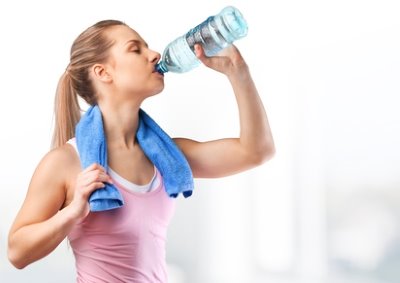
- Rehydrate at the end of the outing: After an effort, the body is in a state of more or less pronounced, but systematic dehydration. Its severity depends on the intensity and duration of the effort, the quality of the drink consumed during the effort and the weather conditions on the day of the effort. Sweating during the activity obviously causes a loss of water as well as a loss of minerals that must be compensated very quickly. Rehydration is thus the primary objective of recovery.
- "Re-sugar" your body: after a long or intense outing, the energy reserves are logically well depleted. It is thus necessary to reconstitute them. To do this, a carbohydrate intake must be made. Ideally, this should be done within 2 hours of physical exertion. All kinds of carbohydrates (low or high GI) can be consumed.
Read also:
Tip 6: avoid snacking
Have you just completed a workout? So don't eat just any food! You need a proper diet. It would be a shame to nibble and destroy the work you have just done. Bad fats or saturated fatty acids tend to stiffen the arteries that need a high "elasticity" during exercise to bring more blood to the muscles. These fatty substances found in cheeses, creams, butter or pizzas, promote weight gain.
Tip 7: avoid alcohol
It is not recommended to drink alcohol when you are athletic. One gram of alcohol brings 7 kilocalories to the body, about twice as much as one gram of sugar. It therefore seems to be an interesting energy resource. Unfortunately, these calories are not usable for muscle effort! Worse, alcohol reduces physical capacities, increases dehydration and alters the regulation of perspiration. It also promotes the production of toxins, hence an extra effort by the body to eliminate them. To optimize your performance, drink but water!
Conclusion
Eating well during your training or competition periods is one of the most important factors in achieving your goals and also in feeling good about your sport. Food must be a rhythm of life for you. So, to optimize your performance, look carefully at what you can and cannot eat. Good nutrition will lead to better performance. To do this, follow my advice: eat your meals at regular times, eat a healthy and varied diet, eat before, during and after exercise, rehydrate after exercise and avoid snacking and alcohol consumption.
These articles may also interest you
Hydration and athletic performance!
Alimentation du sportif : quels glucides faut-il consommer ?
Comment préparer une boisson isotonique de l'effort
Magnésium et sport : attention aux carences !
Nutrition sportive : 5 idées reçues à changer
Photo credits: Fotolia.com

